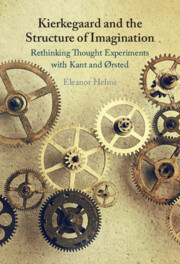Book contents
- Kierkegaard and the Structure of Imagination
- Kierkegaard and the Structure of Imagination
- Copyright page
- Contents
- Acknowledgments
- Abbreviations
- Introduction
- Part I The Origins of “Thought Experiment” in Kant and Ørsted
- Part II A Kantian Account of Thought Experiment
- Part III Kierkegaard and the Concept of Thought Experiment
- Chapter 10 Imaginary Construction and Experiment
- Chapter 11 Controlled Experiments
- Chapter 12 Repetition as Thought Experiment
- Chapter 13 Kantian Strains in Stages on Life’s Way
- Chapter 14 Cognition as Synthesis
- Conclusion
- Bibliography
- Index
Chapter 12 - Repetition as Thought Experiment
A Method of Variation
from Part III - Kierkegaard and the Concept of Thought Experiment
Published online by Cambridge University Press: 26 September 2025
- Kierkegaard and the Structure of Imagination
- Kierkegaard and the Structure of Imagination
- Copyright page
- Contents
- Acknowledgments
- Abbreviations
- Introduction
- Part I The Origins of “Thought Experiment” in Kant and Ørsted
- Part II A Kantian Account of Thought Experiment
- Part III Kierkegaard and the Concept of Thought Experiment
- Chapter 10 Imaginary Construction and Experiment
- Chapter 11 Controlled Experiments
- Chapter 12 Repetition as Thought Experiment
- Chapter 13 Kantian Strains in Stages on Life’s Way
- Chapter 14 Cognition as Synthesis
- Conclusion
- Bibliography
- Index
Summary
Kierkegaard’s book Repetition, along with his descriptions of the book in Concluding Unscientific Postscript, offer a more positive characterization of thought experiments than we find in earlier works. This chapter argues that imaginary construction has a positive aim of identifying underlying continuities. I identify some similarities between Ørsted’s pursuit of invariants and Kierkegaard’s. One new addition in Kierkegaard’s discussions is the role of exceptions. An exception is a case that falls outside a rule without breaking it. Exceptions can neither establish a rule nor refute its necessity, but they can turn attention to the principles and their limits as well as further determine their scope and content. A further similarity between Kierkegaard’s work and Ørsted’s is the fact that variation must be active and free.
Keywords
Information
- Type
- Chapter
- Information
- Kierkegaard and the Structure of ImaginationRethinking Thought Experiments with Kant and Ørsted, pp. 193 - 213Publisher: Cambridge University PressPrint publication year: 2025
Accessibility standard: Inaccessible, or known limited accessibility
Why this information is here
This section outlines the accessibility features of this content - including support for screen readers, full keyboard navigation and high-contrast display options. This may not be relevant for you.Accessibility Information
Content Navigation
Allows you to navigate directly to chapters, sections, or non‐text items through a linked table of contents, reducing the need for extensive scrolling.
Provides an interactive index, letting you go straight to where a term or subject appears in the text without manual searching.
Reading Order & Textual Equivalents
You will encounter all content (including footnotes, captions, etc.) in a clear, sequential flow, making it easier to follow with assistive tools like screen readers.
You get more than just short alt text: you have comprehensive text equivalents, transcripts, captions, or audio descriptions for substantial non‐text content, which is especially helpful for complex visuals or multimedia.
Visual Accessibility
You will still understand key ideas or prompts without relying solely on colour, which is especially helpful if you have colour vision deficiencies.
You benefit from high‐contrast text, which improves legibility if you have low vision or if you are reading in less‐than‐ideal lighting conditions.
